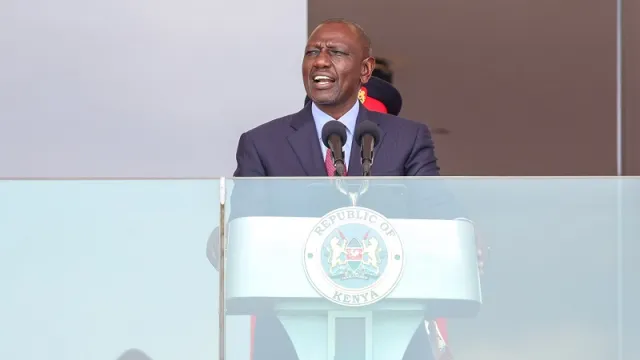The issues Ruto did not talk about in his Jamhuri Day speech

The issues Ruto did not talk about in his Jamhuri Day speech
We celebrated our country's 60th Jamhuri Day on the 12th of December. This year's Jamhuri Day marks six decades since Kenya became a Republic under the leadership of Mzee Jomo Kenyatta, in 1963. The celebrations took place in Uhuru Gardens. Jamhuri Day serves as a reminder of our nation’s journey, struggles, and victories for a patriotic soul.
But in his speech, which was divided into various parts covering the education sector, agriculture, healthcare, the affordable housing program, digitization, sports, and the climate agenda, President William Ruto - the self-proclaimed chief hustler - failed to address the real issues affecting the common hustler at the base of the economic pyramid.
The president reminded us how our forefathers fought the colonizers for the attainment of the political and economic self-determination we enjoy today. He reminisced about how democracy has evolved over the years, from a single-party system to a multi-party system, and lastly, the promulgation of the new Constitution. Notably, he addressed the maturity and ripeness of the rule of law and the integration of devolution for efficient governance at the grassroots. Without a doubt, it was a touching reminder of the victories we have achieved to date.
Read also: CBK rate pushes banks’ limits to keep loan rates low
Inspiring hope
President Ruto could have taken the opportunity of Jamhuri Day to address the current struggles ailing the country and inspire hope for a better future. Among them is the high cost of living, which is at the heart of many hustlers. The country is experiencing high fuel prices that have a trickle-down effect on all sectors of the economy.
The costs of basic commodities are increasing and out of reach for the common Mwananchi. Laughably, Ruto acknowledged Singapore and South Korea to have more progress than Kenya, whereas we attained self-determination at the same time. He could have used that significant opportunity to address the gap between the development and growth of these two countries with Kenya, and outline plans to stir tremendous economic growth shortly.
The president could have discussed the public debt that his government continues to accumulate. Data from the National Treasury placed Kenya’s debt stock at Kes10.189 trillion ($69.3 billion) at the end of June 2023, in contrast to Kes8.579 trillion ($58.4 billion) in June of the previous year.
For instance, the Treasury's earlier projections in its 2023 Budget Policy Statement estimated the country’s debt stock to stand at Kes9.142 trillion ($64 billion) at the end of June 2023. The debt stock has already exceeded the projected Kes10.13 trillion ($69 billion) for June 2024, reflecting the faster-than-expected accumulation of public debt and external borrowing.
It was indeed a platform for Ruto to inform the nation about when his government plans to halt borrowing, especially in the 60th year of economic freedom for the country.
Ruto talked about how the government has strived to increase the budget in the education sector. Although he failed to address the integrity of our education system, which is on the verge of decline due to the reckless handling of KCPE results by KNEC under the Ministry of Education.
School fees
Additionally, the effects of the confusion in the Ministry have been felt up to the tertiary level. This is evident as one of my friends, Kelvin Kimathi, has not received his certificate of module 2 to date. It is ironic, however, that the government is heavily funding education, while secondary school fees are expected to increase in 2024 after the Kenya Secondary Schools Heads Association (Kessha).
The president did not address the high taxation that is detrimental to the poor economic status of Kenyans. Recently, the NTSA proposed a major services fee increase of 3000 percent. However, many companies have relocated their businesses from Kenya due to the high taxation and substantial charges related to operational licenses.
Therefore, this was an opportunity for the president to assure Kenyans of how the government will tackle these issues. The forefathers would be very proud if the concerns affecting the country were addressed on a national celebration day like Jamhuri Day.
Kithinji Nturibi is a law student at Mount Kenya University | @ClintonNturibi



